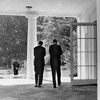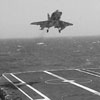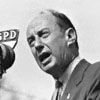DISCUSSION SECTION V
Crisis Management and Coercion
| Is the Cuban Missile Crisis a role model for international realtions?
How accurate was the movie "Thirteen Days?" The BSCIA website on
the cuban missile crisis and
the movie may help you make up your mind. (images taken from website) |
   |
1. What is the difference between deterrence as opposed to
compellence or defense? where does coercion fit in the spectrum between
diplomacy, crisis management, and war? What type of force would each
strategic orientation emphasize and what are their benefits and liabilities?
What is the difference between a punishment or counter-value strategy and
one based on counter-force options like denial and interdiction? Is the
distinction between first strike and second strike forces a useful one,
and how does it enter into the debate between counter-value and counter-force
options?
2. How can states manipulate risk and the "threat that
leaves something to chance" to their advantage in a conflict? Schelling
argues, "If the question is raised whether this kind of 'face' [a country's
reputation for action] is worth fighting over, the answer is that this
kind of face is one of the few things worth fighting over…we lost thirty
thousand dead in Korea to save face for the United States and the United
Nations, not to save South Korea for the South Koreans, and it was undoubtedly
worth it." Do you agree? Do you find Schelling's description of violence
as an inherently "confused and uncertain" activity compelling? What opportunities
and difficulties does the character of violent or potentially violent conflict
pose for a state attempting to manipulate risk to its advantage via "signaling"
in a "war of pain and destruction" or in "violent diplomacy?"
3. How does Pape propose to test the concepts developed
by Schelling, and why does he chose to examine air power rather than land
or sea power? What are Pape’s conclusions about denial and punishment
campaigns and the role of strategic air power? What do you make of
his assessment of the 1991 Gulf War and the limited impact of changing
technology?
4. How does Clark’s description of the NATO campaign against
Yugoslavia fit with Pape and Schelling’s arguments? How would you
classify the NATO air campaign (punishment, denial, something else?), and
why do you think Milosevic ultimately capitulated? How would you
evaluate Clark’s performance using the Clausewitzian concepts you have
already encountered in On War? (This exercise is worth repeating once you
have read the selections in On War from sections VI and VII of the syllabus).


